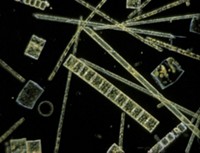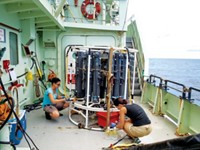Advertisement
Grab your lab coat. Let's get started
Welcome!
Welcome!
Create an account below to get 6 C&EN articles per month, receive newsletters and more - all free.
It seems this is your first time logging in online. Please enter the following information to continue.
As an ACS member you automatically get access to this site. All we need is few more details to create your reading experience.
Not you? Sign in with a different account.
Not you? Sign in with a different account.
ERROR 1
ERROR 1
ERROR 2
ERROR 2
ERROR 2
ERROR 2
ERROR 2
Password and Confirm password must match.
If you have an ACS member number, please enter it here so we can link this account to your membership. (optional)
ERROR 2
ACS values your privacy. By submitting your information, you are gaining access to C&EN and subscribing to our weekly newsletter. We use the information you provide to make your reading experience better, and we will never sell your data to third party members.
Environment
Gulf of Mexico dead zone is largest ever
by Cheryl Hogue
August 7, 2017
| A version of this story appeared in
Volume 95, Issue 32

The 2017 dead zone in the Gulf of Mexico was the largest ever measured, scientists reported on Aug. 2. In late July, scientists from Louisiana State University and the Louisiana Universities Marine Consortium found the area of low or no oxygen in deep waters off the coast of Louisiana and northeast Texas reached 22,730 km2. That’s the largest found since researchers started measuring it in 1985, the U.S. National Oceanic & Atmospheric Administration says. The previous record of 22,007 km2 was set in 2002, NOAA adds. Each spring, the Mississippi River carries nitrogen and phosphorus from farm fields and urban areas within its massive watershed into the Gulf. There, algae consume the nutrients and reproduce rapidly. Eventually, the microorganisms die and drift to bottom waters, where decomposers polish them off, using up dissolved oxygen in the process. Low oxygen levels can decrease reproduction of some fish, reduce the average size of shrimp, and kill bottom-dwelling organisms that can’t move to other areas.




Join the conversation
Contact the reporter
Submit a Letter to the Editor for publication
Engage with us on Twitter